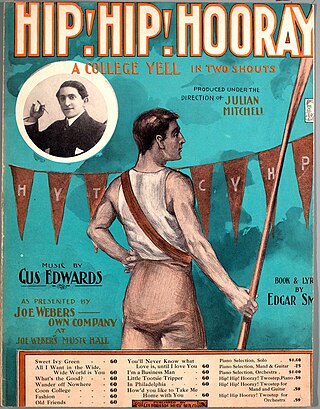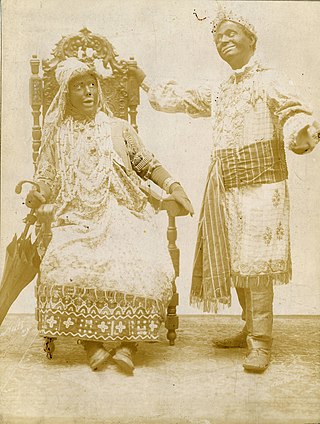Related Research Articles

Jean Schwartz was a Hungarian-born Jewish American composer and pianist. He is best known for his work writing the scores for more than 30 Broadway musicals, and for his creation of more than 1,000 popular songs with the lyricist William Jerome. Schwartz and Jerome also performed together on the vaudeville stage in the United States; sometimes in collaboration with Maude Nugent, Jerome's wife, and the Dolly Sisters. Schwartz was married to Jenny Dolly from 1913-1921.
Around the Clock is a musical in three acts with music by Lee Orean Smith, a book by Steve B. Cassin, and lyrics by J. Sebastian Hiller. The work was created as a starring vehicle for the Scottish comedian Billie Ritchie. A successful "road musical" which premiered in 1906, the work toured extensively for several years for performances in the United States and Europe; including two stints at theaters on Broadway in 1906 and 1908. The show was still touring as late as 1913. Set in Philadelphia, the loose plot takes place inside a music hall and on a vaudeville stage.
Frederick J. Eustis, sometime referred to as F. J. Eustis, was an American composer, conductor, and theatre director. He is best remembered for writing music for several Broadway musicals.
China Rose is an operetta in two acts with music by A. Baldwin Sloane, and both lyrics and book by Harry L. Cort and George E. Stoddard. The work premiered on Broadway at the Martin Beck Theatre on January 19, 1925. In the midst of its Broadway run the production transferred twice, first to Wallack's Theatre and then the Knickerbocker Theatre. The production ended its run at the latter theatre on May 9, 1925; closing after 120 performances.

Louis Harrison was an actor, playwright, comedian, lyricist, librettist, and theatre director. As both a performer and playwright, he was mainly active within the genres of musical theatre and light opera.
The Billionaire is a musical in three acts with music by Gustave Kerker, and both book and lyrics by Harry B. Smith. The show was written with the backing of producers Klaw and Erlanger and was made specifically for the talents of Jerome Sykes who portrayed "The Billionaire", John Doe. The action of the musical begins in Nice, France during Carnival where the billionaire Sykes meets a young American girl, Pansy Good, studying to be an actress. Impressed with her talents, he buys her Doe's Theatre in New York City and establishes her as a star. Later, Doe attempts to ride a horse in a race at the Longchamp Racecourse in Paris, but is too fat to succeed. Pansy rides the horse instead and wins the race.
The Errand Boy is a musical in two acts with lyrics by Edward P. Moore and a book by George Totten Smith. Created as a starring vehicle for vaudeville star Billy B. Van, the composer of the music for this work was never credited. Set in the town of Georges Mills, New Hampshire, the plot centers around the local errand boy Patsy Bolivar who becomes involved with a troupe of traveling performers stranded in his town.
The Gingerbread Man is a musical in two acts with music by A. Baldwin Sloane and both book and lyrics by Frederic Ranken. Described by the creators as a "Fanciful Fairyesque", the work was essentially a Christmas musical with Santa Claus and Mrs. Claus serving as the heroes of the piece.
Coming Thro' The Rye is a "satiretta" or musical in two acts with both lyrics and book by George V. Hobart and music by A. Baldwin Sloane and J. Sebastian Hiller.
The White Hen is a musical in two acts with music by composer Gustav Kerker, a book by Roderic C. Penfield, and lyrics co-authored by Penfield and Paul West. Set in Tyrol, Austria, the story takes place at an inn, 'The White Hen', owned by Hensie Blinder. The musical begins after Blinder returns from a trip to Vienna in which he engaged a matrimonial agency to help him find a wife. Upon his return to the inn, several women arrive in response to the advertisement placed by the agency and a comedy of errors ensues; including Blinder mistakenly believing he has committed the crime of bigamy.
Paul West was an American playwright, lyricist, newspaper editor, journalist, screenwriter, author, and talent agent. After working as a journalist in Massachusetts from 1888 to 1892, he began his career in the theatre as a press representative for Charles H. Hoyt; followed by a season as the business manager for the opera singer and actress Camille D'Arville and the comedian Frank Daniels. From 1898 to 1911 he worked on the editorial staff The New York Sunday World during which time be began a career as a prolific lyricist for both Broadway musicals and Tin Pan Alley publishers of popular song; publishing more the 500 songs during his lifetime. He also worked as a playwright, penning both plays and the books for several musicals. More than 15 of his stage works were mounted on Broadway between the years 1902–1913. In 1904 his children's book The Pearl and the Pumpkin was published; a work which he later adapted into a 1905 musical.

Hip! Hip! Hooray! is a musical in two acts with music by Gus Edwards and both lyrics and book by Edgar Smith.
The Rose of Algeria is a musical in two acts with music by Victor Herbert and both book and lyrics by Glen McDonough. The work features two songs which have become a part of the classical canon of concert repertoire, "Rose of the World" and "Twilight of Barakeesh". The work is set in the country of Algeria at an oasis in the Sahara desert and at a palace in the nation's capital, Algiers. First staged on Broadway under the title Algeria in 1908, the work was a critical failure in its original version. Believing the work was a strong one, Herbert made numerous revisions to the work after the original Broadway production closed. The revised version, now titled The Rose of Algeria, was mounted at Broadway's Herald Square Theatre in 1909 with a completely different cast and a new director. This second version was more successful with critics and audiences.
The Floor Walkers was a road musical that was created as a starring vehicle for the comedy duo of Hap Ward and Harry Vokes to feature their signature roles of the tramps Lord Percy Harden and Lord Harold Poorly ; characters the duo had previously portrayed in the earlier musicals A Run On the Bank (1895) and The Governors (1898). The Floor Walkers had no attributed author for its book or lyrics, but the music for the production was created by composer Herbert Dillea who also served as the musical's music director. The most well known song from the show was "Absence Makes the Heart Grow Fonder"; which was the only song to have an attributed lyricist, Arthur Gillespie. This song was for a time a popular standard and was recorded multiple times by singer Harry Macdonough and cornetist Jules Levy for records made for the Victor Talking Machine Company and Columbia Records from 1902 through 1905, and later was recorded by Wayne King in 1947.

The Ham Tree is a "musical vaudeville" in three acts with music by Jean Schwartz, lyrics by William Jerome, and a book by George V. Hobart. A popular success from its debut in 1905, the work toured for several years; including three separate runs on Broadway. The work was created as a starring vehicle for vaudeville and minstrel show stars James McIntyre and Thomas Heath who were known for their work as blackface performers. The work incorporated several of their prior popular routines and sketches from their work on the vaudeville stage in order to appeal to their fan base. The concept of a "ham tree", along with other humorous trees like an "egg tree", was a repeating gag in their works dating back to their performances in The Georgia Minstrels in the 1890s and early 1900s. Following its initial tour, the work was revived by McIntyre and Heath several times, and was later heavily revised and retitled Hello, Alexander for a Broadway staging in 1919.
Piff! Paff!! Pouf!!! is a musical in two acts with music by Jean Schwartz, lyrics by William Jerome, and a book by Stanislaus Stange. It is considered the best musical created by the writing team of Schwartz and Jerome. A hit with audiences, it was the longest running musical of the 1903-1904 Broadway season. Set on the Atlantic City Boardwalk and at a mansion along the banks of the Hudson River in the Hudson River Valley in the state of New York, the musical follows a recently widowed man whose deceased wife, an heiress, left him her fortune in her will on the condition that he marry off all four of their daughters in the order of their birth prior to receiving any of her money.
Mrs. Delaney of Newport is a musical in three acts with music by Jean Schwartz and both book and lyrics by William Jerome. Written as a starring vehicle for the comedian Kate Elinore and her sister May Elinore, it was the first of several musicals created by the songwriting team of Schwartz and Jerome. The musical premiered on September 15, 1903, at the Collingwood Opera House in Poughkeepsie, New York. The production was produced by the firm of Hyde and Benham.
Up and Down Broadway is a musical revue in two acts with music by Jean Schwartz, lyrics by William Jerome, and a book Edgar Smith. The musical's loose plot concerns the god Apollo who arrives in New York City in the accompany of other Greek deities vowing to improve the theatrical tastes of the American public. In the end they decide Broadway knows more about great entertainment than the Greek gods do. The musical was written as a starring vehicle for Eddie Foy who portrayed the main servant of Apollo, Momus, and provided much of the work's comedic thrust.
Fritz in Tammany Hall is a musical in three acts with music by Jean Schwartz, lyrics by William Jerome, and a book by John J. McNally. The musical takes place in 1905 in New York City and on Long Island. It was a political spoof of New York City politics of that period.
When Claudia Smiles is a musical in three acts with music by Jean Schwartz and both book and lyrics by Anne Caldwell. Set in New York City, the work is based on Leo Ditrichstein's 1903 play Vivian's Papas. The musical began its Broadway run at the 39th Street Theatre on February 2, 1914, and then transferred to the Lyric Theatre where it ultimately closed on March 21, 1914, after 56 performances. The production was directed by Charles Winninger and produced by Frederic McKay. The cast included Blanche Ring, Mahlon Hamilton, Anna Laughlin, and Bertha Mann.